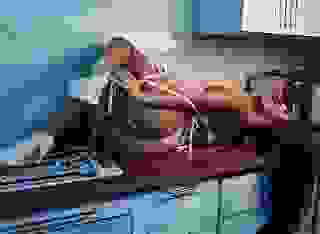Note: You can change font size, font face, and turn on dark mode by clicking the "A" icon tab in the Story Info Box.
You can temporarily switch back to a Classic Literotica® experience during our ongoing public Beta testing. Please consider leaving feedback on issues you experience or suggest improvements.
Click hereAnd yet, the early 2000s were something else entirely.
The internet happened -- and as suddenly came of age at the end of the Clinton era, and then W, or George W Bush, was selected as President -- by judicial coup d'état in Asher's opinion -- and with that moral imperative in mind he launched one of the first independent news journals on the web. Called Veritas, Asher and several like-minded journalistic firebombers now had the venue of their dreams, and in Bush, a subject worthy of their impressive, and impulsive, investigative talents.
And Lindsey watched these developments from the sidelines, often content to look on passively when Asher's exposés tilted to anarchic narcissism, yet a couple of times she reached out to him, wondered what his motives really were.
"At heart," he told her once, "I'm a Leninist. I want to weaken the foundations of the state, make truth a subjective commodity, weaken the current reality in the minds of the people -- until I can replace it with what's needed to bring the state down."
"But...why?"
"Because the state is corrupt. Life in this country is corrupt, it's been corrupted by greed, by an overwhelming lust for money and power. I'm going to use that greed, use that lust and turn it against the establishment. I'm going to get inside, then I'm going to light the match, start the fire and burn the whole fucking thing to the ground. I'm going to do it because that's the only way we'll ever change the course we're on."
"Fight evil with evil, then?"
"What's evil?" he said. "I mean, really, what is it? It's a word, Lindsey, that's all. And the only thing that's ever worked against evil is either pure force or subversion from the inside. War is pointless now, so you have to get inside, subvert from within...and that's all that's left now. The state is too powerful, the truth is what the state says it is."
And he had done just that, too. He was no longer an outsider.
And now, here he was, looking into her eyes -- and she looked in his, saw fires raging in his soul, and she wondered what he wanted from her now.
+++++
She was sitting on the monastery wall, her legs dangling over the abyss, and she was watching the sun come to the day through amber clouds below and around the stones and trees. She took a deep breath, looked at her leg and wanted the pain to stop -- but the pain reminded her of a lesson she had been slow to grasp. Go slow, take care where you put your feet, and understand the next step you take might be your last. She had found peace in the lesson, too. Move slowly through life, the monk said, understand the world around you, understand the consequences of your actions -- and act only when you must.
She heard a tiger's roar that morning, and she thought it sounded forlorn, lonely. Like it was looking for it's mate, and she felt that loneliness as her own.
She thought of loneliness when she looked at the men living in isolation on this cliff, and she thought such enforced isolation was something of an oddity -- at first. Then she realized men had developed systems of religious interpretation around the world, independently of each other, and each had arrived at a similar conclusion: the best way to understand the nature of life -- and the infinite -- was to isolate oneself, and the more extreme the isolation the better. Work -- and think -- in silence, consider the nature of the self, and even the nature of reality, in extreme solitude. Existence, in this monastic framework, became the conceptual basis for introspective self analysis -- and the interesting thing is all this started happening around two thousand of years ago, it happened in several places around the world, and it happened almost concurrently in wildly different belief systems.
Why? She wanted to know -- why had this happened? What caused them to flee? What had caused her to flee?
She had known that one group of desert fathers had wandered off into the Sinai, another into the scorched lands west of the pyramids, a few even before the time of Christ, and in the monastery she learned that the same impulse had enveloped the peoples of Southeast Asia -- and at very nearly the same time.
Why?
Why had a few people separated by impossible distance experienced the same desire for cultural dissolution? Why did John Asher yearn for dissolution? Was it just in the nature of some men to question these things, or had something happened, something fundamental to man's understanding of the world? The first large cities developed during that era, the first systems of laws were implemented, and nomadic man increasingly became domesticated man.
And she thought of John Asher that morning as she watched the sun rise from the monastery wall, about the rage burning in his eyes, and his burning desire to tear everything down.
Had he become a desert nomad too, forced into a life of wandering solitude -- compelled to turn away from teeming hordes of greedy merchants, forced to endure injustice in the name of an all-consuming lust. Was the choice Asher confronted now just as it had been two thousand years ago -- and would that choice endure, as man searched for ways out of the mazes human fallibility imposed? If man is condemned to endure endless failures of the human imagination, would the choice always be to endure -- or flee? Submit, or flee into the desert? Run -- from the world of the possible into the world of -- what? -- An anarchist's oblivion?
From a world of man-made cages into endless halls of mirrors?
The monk who found her, who helped her climb the mountain and who had tried to set her leg, sat beside her in the sunrise, and she thought of the moment as the most sublimely perfect of her life.
+++++
"So, what have you been up to?" Asher asked.
She shook her head. "Not much."
"I read about your trip, in the Times. About how ill you were when you got home."
"Touch and go for a while, or so they told me. How do you like D.C.?"
"It's getting warm, isn't it?"
"I suppose you're happy now?"
"Not quite, but we're getting there."
"I thought about you once, in a monastery -- of all places."
"You thought about me?"
"Yes, you. And Lenin, and Ayn Rand."
"Really?"
"Yes. I thought of a passage in Atlas Shrugged, where Reardon and Taggart are looking out over a ruined industrial landscape, and they look down on destitute workers as vermin to be swept aside, when their utility was gone."
"And that made you think of me?"
"Yes. And isn't that odd? But then again, I've always wondered why you gave in to such an easy hate."
He grinned. "I told you once before. Hate works. Hate is powerful. Hate is readily molded into an easily exploitable energy. And more than anything else, hate is the truth of human existence."
"Ah. Well, I've seen you in here several times the last week or so. Anything I need to know about?"
"Oh, I just wanted to ask you out. To dinner."
"When?"
"Tonight?"
"Alright. I get home around two."
"Could you be ready by four?"
"Of course. I would imagine..."
"Yes, of course, and I'll pick you up then."
"I assume you know where I live?"
He grinned.
"I see. Well..."
"Yeah, I'll see you then," he said as he picked up his coffee, then he stopped and put sugar in his cup then walked out the door.
"My God," Sara whispered. "Is that who I think it is?"
She watched Asher walk out to the now-ancient Land Rover, yet she turned away before he drove off.
"Why did you agree to go out with him?"
She turned to her friend and saw the shock in her eyes. "Because," Lindsey said, "I have to."
"You have to? I wonder...could you, like, tell me why?"
"No. I don't think there's any way I could ever explain."
Sara shook her head, and wondered why Lindsey always seemed to choose the road to ruin. It was so easy for her, and always had been.
+++++
He knocked on her door a few minutes 'til four, and she went out rapidly, closed the door behind her. "You still have the Rover, I see."
"I can't stand the idea of parting with her, for some reason."
"So, where'd you want to go."
"I know a guy with a food truck, makes outrageous tacos. He's supposed to be down in Venice this evening."
"That sounds right."
And because the terrain they inhabited was a scorched land of hard, barren secrets, she knew the choice was anything but random. For once upon a time, in a land just down the road a few miles, they had come into this world together -- in a most unusual, and slightly troublesome way.
+++++
And this troublesome world came to be some forty years before they were born.
At a high school, in Hollywood, California.
When a boy and a girl, not yet fifteen years old, fell in love. They had, for all intents and purposes, been in love since second grade -- when they were seven years old, but love wasn't what they called it.
Ben Asher ran into Sophie Marsalis, literally, one morning during recess, when the entire second grade was out on the playground. Ben was being chased by two neighborhood bullies, running in blind panic; Sophie and a handful of friends were blowing bubbles, looking up at their creations as they drifted away on a mid-morning breeze. The collision was accidental, unanticipated, and both of them claimed to see stars after. Parents were called, trips to doctors hastily arranged, yet both were fine. The next day life resumed where it had left off, only Ben began spending more and more time with Sophie.
No one could explain it, but from that moment on their lives seemed intertwined, like shoots of ivy on an old stone wall, and over time the structure of their lives began to revolve around one simple fact. They were together, and as far as either was concerned, they always would be. The feeling was mutual, and it became bedrock.
And this feeling changed not at all over the years. Not through grade school, not through junior high school, and not even in high school. What did change did so in their fifteenth year, when Ben openly declared his love, in Mrs Graham's Social Studies class, that he loved Sophie and that he always would. And to the astonishment of his classmates, and we'll not even mention Mrs Graham's reaction, Ben produced a ring and asked his Sophie to be his wife.
And not to put too simple a spin on things, Sophie said yes.
And then they kissed one another -- which earned them both a quick trip to Mr Spradlin's office. Mr Spradlin was the vice-principal, and though he was in charge of disciplinary matters, he was a kind-hearted old man; when Mrs Graham frog-marched the star-crossed young lovers into his office he listened to the teacher's explanation and smiled, then asked if he could speak to the two of them -- "and alone, Mrs Graham, if you please?"
When they were alone in the old man's office, he looked at them and sighed.
"Ben, do you understand the solemn nature of what you've just asked of Sophie?"
"Yessir, I do."
"Sophie? Anything to say?"
"No, not really. I've loved Ben all my life, and I'll love him 'til the day I die. And there's not a whole lot more I think needs to be said."
And old man Spradlin had looked at the girl's earnest integrity and nodded his head. "Okay," he said. "Why don't you two wait around in here, 'til the bell rings anyway, then head on to your next class."
Yet by that point word had spread far and wide -- even the librarians were all abuzz with the news -- and everywhere they went people whispered behind little sidelong glances. Until one day, a few weeks later, a handful of the school's bullies tried to taunt Ben Asher about his peculiar brand of lunatic audacity.
And then Ben Asher went ballistic on the bullies.
And bullies being bullies, they fled in terror after two of Ben's right jabs connected, breaking one boy's nose and splitting another's lip.
And, oddly enough, no one ever taunted Ben or Sophie again.
They went to dances together, and to the Senior Prom together, yet by that point they were considered by one and all a married couple -- even if they were just seventeen years old. Classmates, particularly girls in their class, looked at them and sighed, seemed to recognize something 'Serious' about them both, something in their eyes that just seemed settled, and committed -- and they grew envious of her. Boys just assumed Ben was 'gettin' some' on a regular basis, so they were simply jealous as hell -- and that was that.
They stayed in West LA, and started UCLA in 1962; Sophie went pre-Med, while Ben majored in aeronautical engineering, and they planned to marry as soon as they graduated.
Then JFK was murdered, and Ben began to take his studies more seriously, enrolled in ROTC. On graduation day he told Sophie he was reporting to a Naval Aviation Induction Center in Beeville, Texas, to begin flight training, and she was as proud of him as she had ever been. She started her first year of medical school, in Palo Alto, soon after he left.
And she was still proud of him when, four years later, Ben's parents received a telegram from the Secretary of the Navy informing them that their son had been killed over North Vietnam.
And even though this was the swinging sixties, Sophie had changed not at all. She took an internship in Washington DC, at Georgetown, and she met a man, an editor at the Washington Post, a man a few years older than herself. A man named Prentice Hollister. He seemed in a hurry from the first, indeed, almost anxious to marry Sophie, and after a brief courtship they did indeed tie the knot.
And then one day, several months later, her parents called. It was a bleak December day, Sophie told Lindsey once, a day full of gathering snow and silent remorse, and her father told her that Ben had come home. His jet had been shot down but he had made it to Laos, had spent weeks evading capture on a wild trek that saw him chased through the western mountains of North Vietnam by NVA regulars, and they kept up their pursuit of him into Laos -- and he had, somehow, ended up in a country she had never heard of before. A place called Bhutan.
+++++
Lindsey remembered Venice. A destitute, ramshackle little village forty years ago, barren, polluted and sickly, yet now the vibe was trendy, almost punch-drunk. Mature trees adorned tight little streets, the canals no longer gave off a fetid, oil-soaked stench, and hipsters walked her streets now, usually to marijuana dispensaries but occasionally to one of the endless upscale eateries that popped up or passed away with comical regularity. Bikini-clad roller-skaters were as common a sight as transsexuals sunbathing on the beach -- because in Venice the current vibe was 'anything goes' -- and so it was.
John found a parking place for the Land Rover and they took off on foot -- down well-established and long forgotten streets and sidewalks -- and they found a covey of food trucks and ordered tacos and giros and bottles of ginger beer before they walked over to the sidewalk along the beach. They went to a bench they been to a hundred times before and they sat in time to see the sun slip behind clouds far out to sea.
They tipped their bottles, said an ancient toast -- ancient to them, anyway -- then ate in silence, savoring memories they'd made here, together, along the way, then he gathered up their wrappers and bottles and took it down to a rubbish bin. She waited for him, waited for this meeting to begin, while the last of the sun's heat washed over her, and when he got back to her he draped his windbreaker over her shoulders before he sat.
Then he sighed. A long, labored sigh.
"I'd like you to come work for me. In D.C.," he began.
And she looked at him, shook her head. "No, thanks."
"I'm not going to take no for an answer."
"You'll have to, I'm afraid."
He snorted. "Let's see. Your book netted a million..."
"I wish."
"You put that into the house, and you held on to the house for years. You sold it for two point five, put the proceeds into secure, conservative investment portfolios, and your net worth right now is a little south of five mill. Not bad, considering. Now, will you come to work for me in D.C.?"
She looked at him, a blank expression in her eyes, on her face.
"Well, I'll take that as a no. So, tomorrow morning the IRS will place holds on all your accounts..."
"And I'll be on an airplane by then."
"But Lindsey, your Passport has been revoked."
She laughed. "Then I'll start up the Pacific Crest Trail. I've always wanted to walk it."
"Ah, well then, I'll have the US Marshals concentrate their search for you in that area."
"It wouldn't matter."
"I know, but I had to ask."
"So...why?"
"Why? Because I still need you -- I'll always need you. You've always been my conscience, the bedrock my life was built around."
"Funny how things turn out sometimes."
"No. It's not. And it never was, not in the slightest. That was the darkest day of my life, and to me it always will be."
+++++
They were in school together, from the beginning. Beverly Vista, off Rexford in Beverly Hills. They'd walk home together in autumn, their feet kicking through swirls of golden leaves as they danced along perfect sidewalks -- and her mother, Sophie, baked oatmeal cookies with walnuts and raisins in them every Saturday morning. By that time, John's parents lived just blocks away, on Foothill Road -- and the Ashers and the Hollisters spent a fair amount of time together.
One of John's enduring memories of those years was of Lindsey's mother, Sophie, who seemed to become unusually sad anytime she was near his father, and he never understood why, though in a way he saw that he and Lindsey were echoes of other children, and other days. They seemed unusually close for kids so young, like there was a link as yet undiscovered between the two, yet by the time high school came around, and when they first voiced an interest in dating, they were suddenly cut off from one another. There was talk of sending him away to a boarding school, or moving to another school district.
And so perhaps it was John who first thought things through. Sophie Hollister, always sad around his father. Then there were the persistent rumors that Prentice Hollister liked men -- a lot. He watched the way his father ignored Sophie when they were together, and the tender resentment he saw in his own mother's eye whenever Sophie was around.
He was with his father one Saturday morning, driving to the hardware store, when the question came, out of the blue.
"Dad? Is Lindsey my sister?" he asked.
And his father just looked at him, no evasions necessary now, then said, simply, "Yes."
And that was almost all that was ever said about the matter. Lives fluttered and drifted on currents of innuendo and embarrassment, but in truth all that remained between the families over time was silent and dark, like a rough little beast that lurked outside his room, just out of sight.
And despite his misgivings, he told Lindsey a few nights later, when they snuck out of their rooms and met up at the little park north of Santa Monica Boulevard.
"Yes, of course," Lindsey said after he told her, "I think I knew that."
"I feel terrible," he said. "I've loved you all my life, and now..."
"John, you'll love me all your life, because that's what you were born to do."
And then they laughed. They laughed because for the very first time in their lives they felt uncomfortable around one another, like the cogs and gears turning the universe had slipped and fallen away, and were now forever out of reach. But then they drifted apart, too. Gently, at first, but in time more insistently.
No one suspected anything, of course. Just two teenagers who came to a crossroads in the night, and made the only choice they could.
+++++
But uncertain gravities pulled at them from time to time over the years. They called each other when confronted by inconsolable problems, and more than once one leaned on the other's shoulder when grief beckoned.








